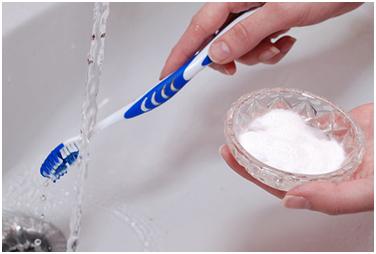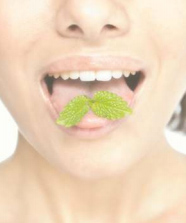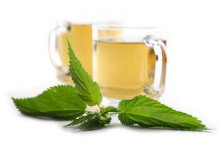We’ve all been there. Even the most diligent tooth brusher will have a moment when they realize their breath is less-than-pleasant – usually at an inopportune moment, like a job interview, first date, or social gathering. But constantly slugging back mouthwash to combat bad breath (also known as halitosis) can have some unintended, negative results – like inflamed gums, dry mouth, an altered sense of taste, tooth staining, and even ulcers. Not to mention the fact toting around a bottle of mouthwash often isn’t practical. The first step to combat bad breath is to brush properly and regularly – including a regular scrub down of your tongue, which is a prime spot for bacteria to camp out and cause halitosis. Beyond that, here are five other ways to slay dragon breath – naturally.

Baking Soda
Is there anything this cleaning agent can’t do? From scrubbing up your home to fluffing up your baked goods, baking soda is also a natural way to freshen up your breath. It works by actually neutralizing built-up acids stuck to your teeth and tongue. You’ve got two options for using baking soda to battle bad breath. The first is to dissolve a half-teaspoon of baking soda in water, and swish it around as you would with mouthwash. The other involves dampening your toothbrush, and then dipping it into the baking soda before brushing up. If you’re diligent with either method, you can expect to see a reduction in bad breath for the long term.
Water
It sounds simple – but a dry mouth is actually one of the leading causes of halitosis. Need proof? Think about how awful your breath tastes in the morning. When you’re sleeping, you produce less bacteria-killing saliva, the same substance that lubricates your mouth and keeps it from getting too dry during the day. But if you’re not chugging enough water during your waking hours, you may also be limiting saliva production, leading to a build-up of bacteria and ultimately, bad breath. The amount of water you should drink per day depends on a number of factors, including how active you are, your size, and age, but a good plan is to start with at least eight glasses of 8 oz or more – ideally water, but other fluids count too. Water can also help rebalance your mouth’s acidity level after a strongly-flavored beverage like coffee and remove leftover bits of food after a meal – after eating or drinking, try swishing a mouthful around as you would with mouthwash, and spit it out.

Spices & Herbs
It may sound counter-intuitive, but dipping into the spice cupboard can actually help clear up bad breath. Chewing on seeds like cloves, cardamom, fennel, or anise have antimicrobial properties that can support your saliva in the war on built-up bacteria. In fact, it’s common practice in Asian countries to carry a small container or bag of one of these seeds for the very purpose of freshening your breath by sucking or chewing on a few of them. There are also a range of herbs that have been known to clear up bad breath – including the ubiquitous parsley sprig on your dinner plate at a restaurant. Other herbal options include peppermint, dill, sage, and rosemary – all of these herbs are rich in chlorophyll, a known warrior against oral germs.
Fruits & Vegetables
Oranges, melons, and berries – not only are they good for your overall health, but with high Vitamin C content, bacteria practically withers on the spot when you chew on them. Fiber-rich raw, crunchy vegetables are also great for eliminating bad breath by increasing your saliva production and helping to scrape away plaque that builds up on your teeth.

Tea
Both green and black tea are loaded with polyphenols, an antioxidant which is a champion at destroying bacteria and compounds that build up in the mouth and can lead to serious oral health problems. Based on the way they’re processed, green tea tends to have less caffeine and retains more polyphenols, but taking the time to sip a few cups of either type per day can help (plus, it’ll count toward your daily hydration totals). Another option is stinging nettle tea, which is known to stimulate your lymphatic system and clean out your kidneys – both of which can factor into halitosis woes. Not a tea drinker? Even a few swishes around the mouth can still help tackle bad breath.
While there’s nothing wrong with using one of these natural methods or mouthwash to freshen your breath, keep in mind that your body may also be trying to tell you something. Chronic bad breath is worthy of a visit to the dentist, as it may be a sign of tooth decay or gum disease. It may also be linked to more serious health problems, like liver or kidney malfunctions, diabetes, or respiratory infections.
Sources:
http://health.howstuffworks.com/wellness/natural-medicine/home-remedies/home-remedies-for-bad-breath2.htm
http://www.dynamicdentalinc.com/blog/bid/81389/How-Baking-Soda-Can-Keep-Your-Mouth-and-Teeth-Healthy
http://health.howstuffworks.com/wellness/hygiene-tips/6-tips-to-cure-bad-breath.htm#page=8
http://www.dailymail.co.uk/health/article-2114728/Green-tea-abolishes-bad-breath-say-scientists.html
http://www.foodmatters.tv/articles-1/7-natural-remedies-for-bad-breath
http://health.usnews.com/health-news/health-wellness/articles/2014/01/08/how-to-prevent-and-treat-bad-breath
http://www.webmd.com/balance/news/20030520/tea-fights-bad-breath-mouth-bacteria


